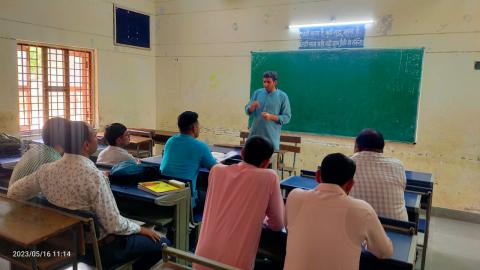
Exploring the Intersection of Ontology and Pedagogy
The opportunity to engage with teachers is an opportunity that stirs the tranquility of the mind and creates the context for new questions to arise. In one of my previous articles, I wrote about Fundamental beliefs and how they affect the teaching-learning process. In this article, I will investigate the impact of ontology on pedagogy.
First of all, let's define the two words.
Ontology: In philosophy, ontology is the study of being, existence, or reality. It is the branch of metaphysics that seeks to answer questions about the nature of things and their fundamental properties.
Pedagogy: Pedagogy refers to the methods and strategies used in teaching and education. It's about how teachers or educators plan and deliver lessons, interact with students, and create a supportive learning environment.
The pedagogy of a teacher cannot be independent of their ontology. When we say "the ontology of a teacher," we are referring to the fundamental nature or essence of what it means to be a teacher. It involves examining the essential characteristics, roles, and responsibilities that define the identity and function of a teacher. The ontology of a teacher goes beyond the specific knowledge and skills they possess. It delves into their deeper qualities, values, and beliefs that shape their teaching practice.
In this context, when we examine the outcome of the training that we provide, we often see that it's the ontology of the teachers that neutralizes the new pedagogical skills we introduce. For example, the Mission Buniyaad classes organized in Delhi government schools aimed to introduce a new pedagogy, which can be largely defined as a whole language pedagogy, particularly in the context of English and Hindi. In an English classroom, there may be children who are just learning letters and others who can read fluently. We ask teachers to teach stories to students and provide opportunities for vocabulary practice and spoken English activities.
However, traditional training (the ontology of the teachers) often leads teachers to wonder how a child who doesn't recognize letters can participate in spoken English activities. The traditional approach suggests introducing language gradually, starting with reading, then writing, followed by speaking, and finally, listening. It took most of us 12 to 15 years to learn a new language in this sequential manner, and we still struggle to improve it. On the other hand, the whole language pedagogy does not isolate the different functions of language, making it more effective.
Nevertheless, there are critics of whole language pedagogy. They argue that it may not provide enough explicit instruction in specific reading and writing skills, such as comprehension strategies, grammar rules, and spelling conventions. They believe that a more balanced approach, combining whole language with explicit skill instruction, is necessary to support comprehensive literacy development.
In our classrooms, introducing a new pedagogy is not easy. Teachers often fall back to the pedagogical approaches they are accustomed to. Sometimes during observations, they try to follow the introduced pedagogy, but it's like slowing down a car when a speed camera appears on the road and then returning to the default speed when the camera is no longer present. Most of our teachers have default pedagogic practices deeply influenced by their ontology. The real question is, do we ever think about how ontology influences pedagogy and what we can do about it?
- Log in to post comments
